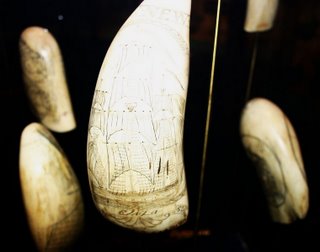
Monday, November 13, 2006
The Daily Hump: Scrimshaw
I'm back! The past two weeks have been exceptionally busy for the WordHumper (the person, not the site). But, the bulk of this work is now behind me and I'm ready to once again take my seat at the Wordhumping helm. So without further ado...
 Scrimshaw is a type of art practiced by sailors to pass the time during long voyages at sea. It's the art of carving intricate designs onto whale bones, whale ivories, seashells, etc... using walrus tusks, whale teeth or anything else sailors can find. Michael Quinion reports
Scrimshaw is a type of art practiced by sailors to pass the time during long voyages at sea. It's the art of carving intricate designs onto whale bones, whale ivories, seashells, etc... using walrus tusks, whale teeth or anything else sailors can find. Michael Quinion reports
Here's my theory: When one scrimshaws they're carving with a sharp point. Is it then possible that scrim- reflects the tool of the scrimshaw artisan--that sword-like tip of the walrus tooth that's used to create the intricate designs? -shaw is a bit more difficult to understand, but given that scrimshaw went through so many variations (see Michael Quinion's quote above) where only the scrim- portion remained constant then it appears that -shaw is not critical to the meaning of scrimshaw. Rather, it could be that the -shaw ending was ultimately employed simply because Scrimshaw is an English surname in relatively common usage; that is, scrimshaw came to mean carving with a sharp point (the scrim) via some sort of slang process (similar to the slang substitutions we see in Cockney rhyming slang, where the substituting word has no literal relationship to the original word it's replacing.). Just an idea...
 Scrimshaw is a type of art practiced by sailors to pass the time during long voyages at sea. It's the art of carving intricate designs onto whale bones, whale ivories, seashells, etc... using walrus tusks, whale teeth or anything else sailors can find. Michael Quinion reports
Scrimshaw is a type of art practiced by sailors to pass the time during long voyages at sea. It's the art of carving intricate designs onto whale bones, whale ivories, seashells, etc... using walrus tusks, whale teeth or anything else sailors can find. Michael Quinion reports The origin of the word is almost totally mysterious; it was first recorded about 1825, but its spelling in the first half of the nineteenth century was variable, with forms such as scrimshonting, scrimshonging, scrimshandy, scrimshanking and skrimshander all appearing at various times. There’s some suggestion that our modern spelling was influenced by the proper name Scrimshaw, but nobody seems to know quite why. Since a person who did this on board ship wasn’t working, it may be that the British English scrimshank, to shirk one’s duty, came from the same source.According to the Online Etymology Dictionary the English surname Scrimshaw is attested to as far back as 1154 and comes from the Old French escremisseor, "fencing-master" (that's fencing as in swords, not chain-links). In the OED we find the early 17th c. word scrimer, defined as "fencer", which is a variation of escrimer, or "swordsman". The modern sports term scrimmage come from this French root, as does skirmish.
Here's my theory: When one scrimshaws they're carving with a sharp point. Is it then possible that scrim- reflects the tool of the scrimshaw artisan--that sword-like tip of the walrus tooth that's used to create the intricate designs? -shaw is a bit more difficult to understand, but given that scrimshaw went through so many variations (see Michael Quinion's quote above) where only the scrim- portion remained constant then it appears that -shaw is not critical to the meaning of scrimshaw. Rather, it could be that the -shaw ending was ultimately employed simply because Scrimshaw is an English surname in relatively common usage; that is, scrimshaw came to mean carving with a sharp point (the scrim) via some sort of slang process (similar to the slang substitutions we see in Cockney rhyming slang, where the substituting word has no literal relationship to the original word it's replacing.). Just an idea...
Labels: Old French, The Daily Hump
:: posted by David, 8:35 AM
1 Comments:
Very interesting blog you've got here. By chance, I had heard of a scrimshaw before having read "Gus Openshaw's Whale Killing Journale".
Nice header. Made me laugh.
Nice header. Made me laugh.
